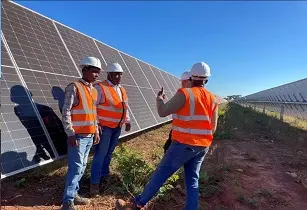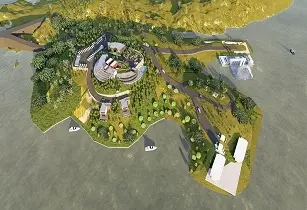The energy transition has the potential to boost employment in the renewable energy sector substantially in Africa, up from around 0.35 mn in 2020 to more than 4 mn by 2030 and more than 8 mn by 2050
Africa accounts for almost 20% of the world’s population and it has ample resources. However, it is the destination for just 2% of global clean energy spending according to a recent report from the International Energy Agency (IEA) and the African Development Bank Group. Overall, energy investment on the continent needs to more than double by 2030 to meet African development ambitions, as well as international energy access and climate goals.
The energy transition, with its systematic shift to renewable energy, needs to be understood not as a burden imposed on the world’s most vulnerable people, but as a vast opportunity to improve livelihoods across Africa in ways that transcend the pure economic benefits.
By driving the development of new industries such as solar and wind power, geothermal, or bioenergy, the energy transition can have a significant, positive impact on GDP, job creation, and welfare across the African continent. The International Renewable Energy Agency’s (IRENA) analysis shows that renewables and other sustainable technologies have already created 1.9 mn jobs across Africa, a number that will grow substantially as countries invest further in the energy transition.
In recent years, the systematic and global shocks of the COVID-19 pandemic and the Russia-Ukraine war have brought a tremendous increase in price volatility and dislocation of energy supply chains. We are now once again facing increased volatility in energy markets as a result of the Israel-Gaza conflict.
These shocks have fundamentally reshaped the energy landscape and commodity markets, which are incredibly sensitive to geopolitics. Energy security has moved again to the top of political agendas across the world.
The implications of the situation in the Middle East are currently unknown as the world watches events unfold. If the conflict continues to escalate, the global economy could be facing a dual energy shock from two ongoing wars, putting pressure on supply chains, and driving changes in demand.
Impact on the continent’s energy systems
These overlapping crises are affecting many parts of Africa’s energy systems, including reversing positive trends in improving access to modern and cleaner energy sources.
At BB Energy, we are committed to using our capabilities to progress the global energy transition. We are involved in several initiatives aiming to accelerate Africa’s energy transition and support the continent’s economic and social potential. We appreciate that this journey does not look the same for different regions across the globe. The common goal is achieving a just transition, where everyone has access to cleaner and safer energy sources.
In 2020, we established a separate division dedicated to renewable energy and emission reduction projects. Since then, our company has directly and indirectly invested in dozens of green projects in solar energy, battery storage, electric vehicle charging infrastructure, decarbonisation technologies, and emission reduction initiatives throughout Africa.
In 2021, we acquired Solarcentury Africa – an integrated solar developer. We want to make Solarcentury Africa the platform from which we launch a suite of renewable energy projects across Africa. This is a powerful way to profitably leverage our presence in this continent and there is plenty of potential often overlooked by other energy players. So far, we have secured over 850 MW of solar projects and established a pipeline consisting of more than 4.5 GW of solar energy and battery storage projects across Africa.
We are also in the process of launching our power trading business in the Southern African Development Community (SADC). BB Energy has decades of trading experience in Africa and aims to become one of the first merchant players to trade green power on the Southern African Power Pool (SAPP) markets. In line with this, we are co-developing one of the first Solar PV plants of 20MWp in Namibia.
We want to do more to help reduce the global carbon footprint. In 2022, we launched a flagship project in Rwanda to replace traditional fire stoves with 500,000 improved cookstoves, which aims to reduce CO₂ emissions by a target of eight million tonnes over its lifetime.
Earlier this year, we invested in Gasmeth Energy, Rwanda’s first indigenous natural gas developer. The company focuses on the responsible extraction, processing, and distribution of naturally occurring methane gas from Lake Kivu, one of the African Great Lakes.
This naturally occurring gas will be separated from the lake waters and processed into compressed natural gas, a non-fossil biogas, which will replace conventional fuels across the country’s transport, industrial, and power generation sectors, as well as the use of wood for cooking and heating.
The project will provide an abundant source of domestically produced natural gas to transform the Rwandan economy, breaking the dependence on imported fuels. Crucially, this will significantly reduce the outflow of money from the country, which can be better spent on more pressing needs, such as health and education. Our work in Rwanda is expected to remove approximately seven million tonnes of CO₂, improving local people’s health, and reducing the country’s pollution. It will represent a significant step towards a green, secure, and affordable future.
Looking at the future, we see an enormous opportunity in e-mobility in Africa, specifically in battery swapping for e-bikes. The acceleration in e-bikes will far exceed that of other forms of transportation in Africa.
We aim to 'walk the walk' and carefully assess how and where we can bring value by deploying our resources in a responsible manner to support the communities in which we operate while playing our part in the global energy transition.
Delivering modern energy to all Africans will require nearly US$25bn in spending per year to 2030, according to the IEA. This is a small amount in the context of global energy spending – equivalent to the investment needed to build one new liquefied natural gas (LNG) terminal a year.
These initiatives require financial support of a different kind, given the need for small-scale projects, often in rural areas and for consumers with limited ability to pay. At BB Energy, we have the trading experience, expertise, and capital to invest in Africa’s energy future.

The writer of the article is Mohamed Bassatne, CEO of BB Energy









